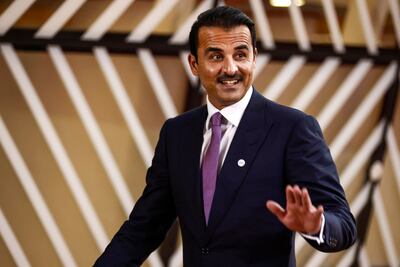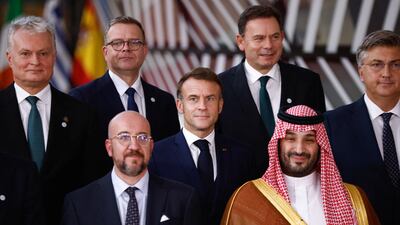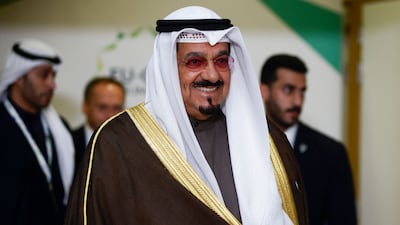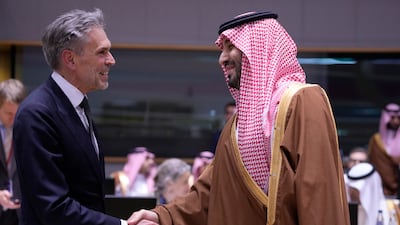EU and Gulf Co-operation Council leaders called for immediate ceasefires in Lebanon and in Gaza at a historic summit in Brussels on Wednesday, as they pledged to strengthen political and economic ties.
The summit was the first of its kind since the signing of the initial EU-GCC co-operation agreement in 1989. Both sides emphasised the need for closer collaboration amid regional conflicts and global challenges.
“We deplore all loss of civilian life, in particular children, as well as the catastrophic levels of hunger and imminent risk of famine, caused by the insufficient entry and distribution of delivered aid into Gaza,” read a joint statement issued after the meeting.
Qatar's Prime Minister and Minister of Foreign Affairs, Sheikh Mohammed bin Abdulrahman, said that leaders saw "eye to eye" on many topics. "We had a very candid discussion on different issues," he told reporters.
An EU official described the atmosphere as "very positive." "Both sides underlined the intensive preparation and the engagement of the leaders to make the summit happen and conclude with an agreed statement," they said.
Leaders agreed to hold the summit every two years, with the next meeting to take place in Saudi Arabia in 2026.
Prominent figures at the summit included Saudi Crown Prince Mohammed bin Salman. The UAE delegation was led by Sheikh Maktoum bin Mohammed, First Deputy Ruler of Dubai, Deputy Prime Minister and Minister of Finance.
While most EU leaders were in attendance, notable absentees included German Chancellor Olaf Scholz, and the leaders of Austria, Slovakia, Denmark and Poland. A group photo, initially planned for 3pm, was delayed by nearly three hours due to the late arrival of French President Emmanuel Macron.
Ukraine integrity
The war in Ukraine was a key issue on the agenda. The joint statement called for respect of Ukraine's territorial integrity and made reference to UN resolutions condemning Russia's 2022 invasion. However, additional reference to Russia's "aggression against Ukraine," which appeared in an earlier draft, was removed, reflecting differing views on the conflict.
In an apparent nod to some EU members' strong ties with Israel, the statement remained vague on Lebanon and did not explicitly refer to Israel or Hezbollah.
"We are extremely concerned by the dangerous escalation in Lebanon, affirm our support for the Lebanese people, and call for an immediate ceasefire," read the statement.
"Leaders did not shy away from recognising that both sides have different views on some issues. But they consistently agreed that both groups strive to contribute to prosperity, security, peace and co-operation," the EU official said.
EU-GCC summit - in pictures
While the EU has maintained a united front in its support for Ukraine, divisions persist over the Middle East.
In his opening remarks, Qatari Emir Sheikh Tamim, who co-chaired the summit with EU Council President Charles Michel, warned against "double standards," a sentiment echoed by Qatar's Prime Minister, Sheikh Mohammed.
"It’s very important to base our partnerships on common interest and principles," Sheikh Mohammed said, standing alongside the EU's foreign affairs chief Josep Borrell and GCC secretary general Jasem Al Budaiwi. "We should stand up for them and never be selective about them."
Several European leaders, particularly those vocal in their support for Palestinian rights, acknowledged differences between the EU and the Gulf's approaches to the conflicts in Ukraine and in the Middle East.
Slovenia's Prime Minister Robert Golob, arriving at the summit, expressed a desire for greater consistency in the bloc's foreign policy.
"What I would like to see is having the same standards for both," Mr Golob said. "Being impartial – whenever there is a violation of humanitarian and international law, we should act in the same way."
Asked whether that was what the EU had done so far, Mr Golob, whose country recognised Palestinian statehood in June, answered: "Unfortunately, we are not there yet."
Cinzia Bianco, a research fellow on Europe and the Gulf at the European Council on Foreign Relations, told The National that the summit had succeeded in pushing for more alignment on geopolitical issues.
"There was a good participation, and it makes a difference when you have the ability to engage so many of the member states at the same time," Ms Bianco said.

Visas "very important"
One of the more sensitive points was on Iran, EU diplomats said. In their joint statement, leaders said it was important to keep engaging with Iran "to pursue regional de-escalation". GCC countries were reportedly keen to tone down language on Tehran as they were eager to avoid an all-out regional war against Israel.
Trade relations were also a key focus, as both the EU and the GCC sought to revive talks on a free trade agreement that stalled in 2008. In 2023, the EU was the GCC’s second largest import partner, at €93.8 billion ($102 billion), and fourth-largest export partner, at €76.3 billion.
The joint statement left open the possibility of pursuing bilateral and bloc-to-bloc agreements. "We will aim to take forward our discussions at regional level with a view to reach a regional GCC-EU free trade agreement including an investment chapter," they wrote.
"In light of the co-operation arrangements signed between EU and GCC countries, we will continue to explore tailor-made agreements supporting trade and investments."
Visa waivers for GCC citizens wishing to travel to Europe was a pressing demand from some countries, in particular Saudi Arabia, Kuwait and Qatar. Despite the EU harmonising visa requirements this year, obstacles remain. Leaders said they would continue to work "on practical and constructive steps towards a safe and mutually beneficial visa-free travel arrangement between the EU/Schengen and the GCC countries".
Visas are a "very important file for GCC citizens," said Mr Al Budaiwi. "We do believe that there is a big opportunity for the GCC to be granted that waiver. We also believe that the presence of GCC citizens in Europe is a positive presence."
Leaders also pledged stronger engagement on other issues, including telecommunications, green energy investments and humanitarian aid. There is hope among Gulf nations that this summit will be followed by concrete projects, including infrastructure for renewable energy.












